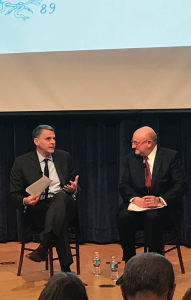
Center for Jewish Civilization Director Jacques Berlinerblau, left, moderated a talk with United States Special Envoy to Monitor and Combat Anti-Semitism Ira N. Forman.
A collective response is needed against the recent worldwide swell of anti-Semitism, according to former United States Special Envoy to Monitor and Combat Anti-Semitism Ira N. Forman in an event hosted by the Georgetown University Center for Jewish Civilization on Wednesday.
“Words are terribly important. It’s absolutely essential for not just the president, but Congress, and local elected officials, to speak out,” Forman said in the Intercultural Center Auditorium. “If civil society does not come to our side, it’s over. This is about the very values of the French republic. By extension, you could say it’s about the values of liberal democracy. That’s what’s at stake.”
According to Forman, while 49 percent of Americans surveyed agreed with the statement that anti-Semitism in the United States is a very serious or somewhat serious problem in a Quinnipiac University poll conducted last February, 70 percent of responders agreed with the same statement in the same poll conducted last week.
“There has been a real change in the United States of, at least, perceptions of incidents of anti-Semitism,” Forman said.
Anti-Semitism has come under the spotlight in recent months. There have been 67 bomb threats against Jewish community centers since January, according to The New Republic, while in February, tombstones in a Jewish cemetery in St. Louis, were turned over.
Forman said the complexity of modern-day anti-Semitism renders easy solutions impossible.
“There are no simple silver bullets here that we have, partly because of the difficulty and the complexity of the problem,” Forman said.
Forman said, however, that Jews are not in as dire straits as they were in the 1930s, when Jews faced persecution around the world, including in Nazi Germany. However, he warned that the world must learn from that perilous decade.
“Is this the 1930s? The answer is no, it is not. But if it’s not the 1930s, there are some really important lessons and issues we have to deal with. First of all, I believe history does run in cycles,” Forman said.
Forman specifically highlighted economic transformations as a trigger for xenophobia that corresponds with a rise in anti-Semitism.
“What pops for me out of the 1930s is economic dislocation and the rise of xenophobia. The other thing that is very clear is that we are 70 years past the Holocaust,” Forman said. “The generation that was alive during the Holocaust is quickly dying off. We forgot the implications, and that maybe is natural.”
As U.S. special envoy, Forman said he noticed how anti-Semitism takes different shapes in different countries.
“Xenophobic right-wing nationalism is driving anti-Semitism in Hungary. In France, you have xenophobic right-wing nationalism, but Jews also face anti-Semitism from the extreme left, often associated with green or anti-colonial movements, or anti-Israel sentiment,” Forman said.
Forman said prejudice against Jews could be seen as a feature, rather than an exception, of Western society.
“Whether it’s Hellenistic anti-Semitism during the Commonwealth Period, Christian anti-Semitism that dominated the first millennium and a half of the common era, racist anti-Semitism in the post-Enlightenment era or even anti-Semitism that is often masked behind anti-Israel rhetoric; all those have commonalities that are central to Western civilization,” Forman said.
Collective action by civil society is more ingrained in American culture than in European culture, according to Forman.
“In the U.S., civil society generally does stand up. We can do it better — we can certainly do it better against Islamophobia — but we have that mechanism that is really important. That mechanism does not largely exist in Europe.”
Georgetown Israel Alliance’s Political Chair Tanner Larkin (SFS ’20), who attended the event, said he appreciated that Forman distinguished anti-Semitism from criticism of Israel.
“It was very important that he highlighted that anti-Semitism and anti-Israel criticism are not the same thing, and people should not fall into the trap of automatically accusing anti-Israel sentiment of being anti-Semitic,” Larkin said. “However, they often are associated with one another.”
Larkin said that despite increased incidents against Jews in America, he has felt increased support from the community, especially from non-Jews.
“I felt a real upsurge in support for the Jewish community from many non-Jews, including many Muslims,” Larkin said. “It’s been a real wake-up call that anti-Semitism is present in our society, and we need to stand up against it.”




















